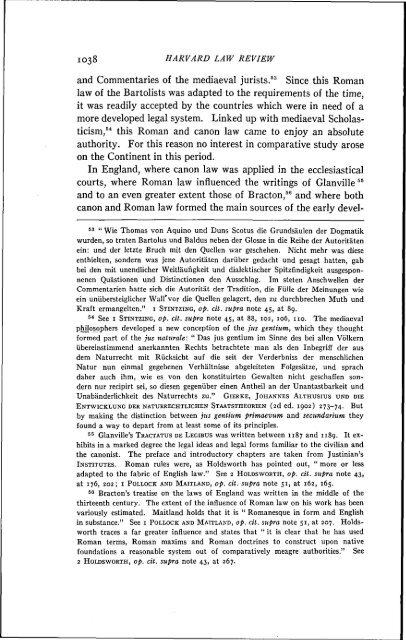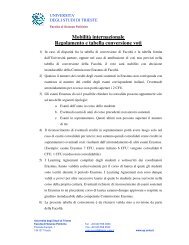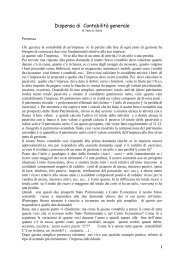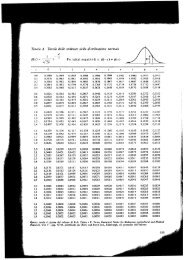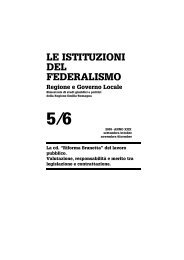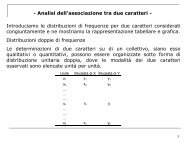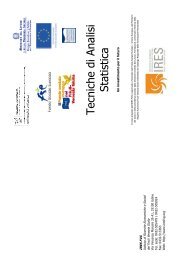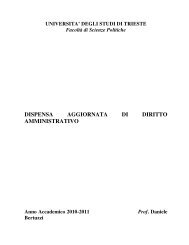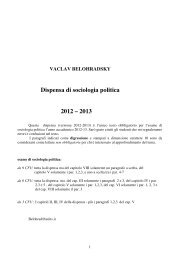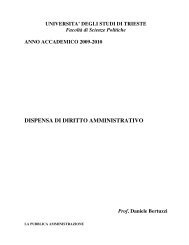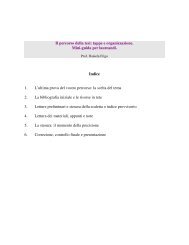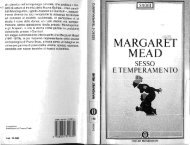THE HISTORY OF COMPARATIVE LAW * ^COMPARATIVE law, as ...
THE HISTORY OF COMPARATIVE LAW * ^COMPARATIVE law, as ...
THE HISTORY OF COMPARATIVE LAW * ^COMPARATIVE law, as ...
Create successful ePaper yourself
Turn your PDF publications into a flip-book with our unique Google optimized e-Paper software.
1038 HARVARD <strong>LAW</strong> REVIEW<br />
and Commentaries of the mediaeval jurists."^ Since this Roman<br />
<strong>law</strong> of the Bartolists w<strong>as</strong> adapted to the requirements of the time,<br />
it w<strong>as</strong> readily accepted by the countries which were in need of a<br />
more developed legal system. Linked up with mediaeval Schol<strong>as</strong>ticism,^*<br />
this Roman and canon <strong>law</strong> came to enjoy an absolute<br />
authority. For this re<strong>as</strong>on no interest in comparative study arose<br />
on the Continent in this period.<br />
In England, where canon <strong>law</strong> w<strong>as</strong> applied in the ecclesi<strong>as</strong>tical<br />
courts, where Roman <strong>law</strong> influenced the writings of Glanville '*'<br />
and to an even greater extent those of Bracton,^" and where both<br />
canon and Roman <strong>law</strong> formed the main sources of the early devel-<br />
63 " ^ie Thom<strong>as</strong> von Aquino und Duns Scotus die Grundsaulen der Dogmatik<br />
wurden, so traten Bartolus und Baldus neben der Glosse in die Reihe der Autoritaten<br />
ein: und der letzte Bruch mit den Quellen war geschehen. Nicht mehr w<strong>as</strong> diese<br />
enthielten, sondern w<strong>as</strong> jene Autoritaten dariiber gedacht und gesagt hatten, gab<br />
bei den mit unendlicher Weitlaufigkeit und dialektischer Spitzfindigkeit ausgesponnenen<br />
Qu<strong>as</strong>tionen und Distinctionen den Ausschlag. Im steten Anschwellen der<br />
Commentarien hatte sich die Autoritat der Tradition, die Fulle der Meinungen wie<br />
ein unubersteiglicher Wall'vor die Quellen gelagert, den zu durchbrechen Muth und<br />
Kraft ermangelten." i STINTZING, op. cit. supra note 43, at 89.<br />
^* See I STINTZING, op. cit. supra note 45, at 88, 102, 106, no. The mediaeval<br />
philosophers developed a new conception of the ;!« gentium, which they thought<br />
formed part of the jus naturale: " D<strong>as</strong> jus gentium im Sinne des bei alien Volkern<br />
ubereinstimmend anerkannten Rechts betrachtete man als den Inbegriff der aus<br />
dem Naturrecht mit Riicksicht auf die seit der Verderbniss der menschlichen<br />
Natur nun einmal gegebenen Verhaltnisse abgeleiteten Folgesa,tze, und sprach<br />
daher auch ihm, wie es von den konstituirten Gewalten nicht geschaffen sondern<br />
nur recipirt sei, so diesen gegeniiber einen Antheil an der Unant<strong>as</strong>tbarkeit und<br />
Unabanderlichkeit des Naturrechts zu." GIERKE, JOHANNES ALTHUSIUS UND DIE<br />
ENTWICKIUNG DER NATURRECHTLICHEN STAATS<strong>THE</strong>ORIEN (2d ed. 1902) 273-74. But<br />
by making the distinction between jus gentium primaevum and secundarium they<br />
found a way to depart from at le<strong>as</strong>t some of its principles.<br />
^^ Glanville's TRACTATUS DE LEGIBUS w<strong>as</strong> written between 1187 and 1189. It exhibits<br />
in a marked degree the legal ide<strong>as</strong> and legal forms familiar to the civilian and<br />
the canonist. The preface and introductory chapters are taken from Justinian's<br />
INSTITUTES. Roman rules were, <strong>as</strong> Holdsworth h<strong>as</strong> pointed out, " more or less<br />
adapted to the fabric of English <strong>law</strong>." See 2 HOLDSWORTH, op. cit. supra note 43,<br />
at 176, 202; I POLLOCK AND MAITLAND, op. cit. supra note 51, at 162, 165.<br />
^^ Bracton's treatise on the <strong>law</strong>s of England w<strong>as</strong> written in the middle of the<br />
thirteenth century. The extent of the influence of Roman <strong>law</strong> on his work h<strong>as</strong> been<br />
variously estimated. Maitland holds that it is " Romanesque in form and English<br />
in substance." See i POLLOCK AND MAITLAND, op. cit. supra note 51, at 207. Holdsworth<br />
traces a far greater influence and states that " it is clear that he h<strong>as</strong> used<br />
Roman terms, Roman maxims and Roman doctrines to construct upon native<br />
foundations a re<strong>as</strong>onable system out of comparatively meagre authorities." See<br />
2 HOLDSWORTH, op. cit. supra note 43, at 267.


